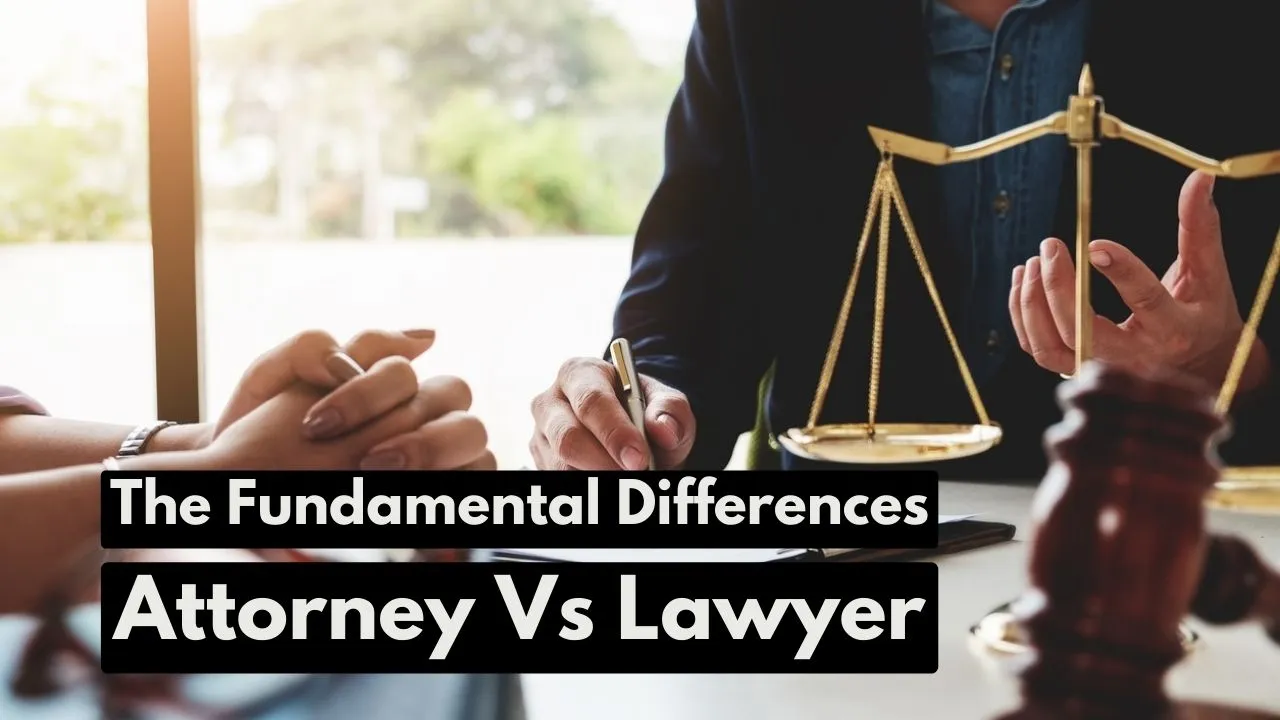“Attorney” and “lawyer” are often used interchangeably, but there are some distinctions in their definition, usage, and meanings, depending on the context and jurisdiction.
The main difference between an attorney vs lawyer boils down to licensing.
- Lawyer: A broader term referring to anyone who has graduated from law school with a Juris Doctor (J.D.) degree. They may or may not have passed the bar exam.
- Attorney: A lawyer who has passed the bar exam and is licensed to practice law in a specific jurisdiction (like a state). This grants them the authority to represent clients in court, handle legal proceedings, and offer legal advice directly.
To understand easily, here is an simple analogy: Think of “doctor” as a general term for someone in the medical field. You could be a doctor, a nurse, or a medical assistant. An “attorney” would be similar to a licensed physician who can perform surgery and practice medicine independently.
- Not all lawyers are attorneys, but all attorneys are lawyers.
- There might be slight variations in terms depending on the region. For instance, some countries use “solicitor” instead of attorney.
- The term “attorney” might have specific uses in certain contexts, like referring to someone with a Power of Attorney (legal authority to act on another’s behalf).
While both attorneys and lawyers are involved in the legal field, attorneys have the extra layer of qualification through the bar exam, allowing them to take on a wider range of legal responsibilities.
Let’s see What’s The Difference Between a Lawyer And An Attorney with the help of table format.
What’s The Difference Between a Lawyer And An Attorney ?
| Aspect | Lawyer | Attorney |
|---|---|---|
| Definition | A person who is trained in and studied law. | A lawyer who is licensed to represent clients in court. |
| Scope of Work | Can provide legal advice, draft legal documents, and more. | Can represent clients in court and give legal advice. |
| Representation | May or may not represent clients in court. | Typically represents clients in court proceedings. |
| Licensing | Required to have a law degree but not necessarily licensed. | Must be licensed to practice law in a specific jurisdiction. |
| Functionality | Can work in various legal capacities, including non-litigation roles. | Primarily focuses on litigation and courtroom representation. |
| Role in Court | Can provide legal counsel but may not argue cases in court. | Advocates for clients in court proceedings. |
| Legal Authority | Can provide legal opinions and advice. | Has the authority to represent clients legally. |
| Jurisdiction | Can work in any field of law without court representation. | Limited to practicing law within the jurisdiction(s) they are licensed. |
Differences In Roles And Duties – Attorney vs Lawyer
| Aspect | Attorney | Lawyer |
|---|---|---|
| Representation | Represents clients in legal matters, including court. | May or may not represent clients in court; can provide legal advice and draft legal documents. |
| Courtroom Advocacy | Argues cases in court on behalf of clients. | May not argue cases in court but can provide legal counsel and represent clients in other legal matters. |
| Legal Authority | Has the authority to represent clients legally. | Can provide legal opinions and advice, but may not necessarily be authorized to represent clients in court. |
| Licensing | Must be licensed to practice law in a specific jurisdiction. | Required to have a law degree but not necessarily licensed to practice law. |
| Focus | Primarily focuses on litigation and courtroom representation. | Can work in various legal capacities, including non-litigation roles. |
| Client Interaction | Engages directly with clients to understand their legal needs and represent them effectively. | Interacts with clients to provide legal advice, draft legal documents, and potentially represent them in non-litigation matters. |
Professional Scope of Lawyers And Attorneys Comparison

| Aspect | Lawyer | Attorney |
|---|---|---|
| Qualifications | Holds a law degree and is knowledgeable in legal matters | Holds a law degree and is knowledgeable in legal matters |
| Legal Advice | Provides legal advice to clients | Provides legal advice to clients |
| Document Drafting | Drafts legal documents such as contracts, wills, etc. | Drafts legal documents such as contracts, wills, etc. |
| Representation in Legal Matters | May represent clients in non-litigation matters | Represents clients in legal proceedings, including court appearances |
| Advocacy | Does not appear in court on behalf of clients | Appears in court on behalf of clients |
| Legal Research and Analysis | Conducts legal research and analysis | Conducts legal research and analysis |
| Licensing Requirements | May or may not be licensed to appear in court | Licensed to appear in court |
The above table illustrates the distinctions in the duties and responsibilities between lawyers and attorneys, which emphasize the role of attorneys in representing clients in legal proceedings, including court appearances, compared to lawyers who may not have this specific licensure.
While lawyers and attorneys share many similarities in terms of their legal training and expertise, the distinction lies in the authority to represent clients in legal proceedings, with attorneys having the specific licensure to do so.
Professional Scope of Lawyers
Legal Advice: Lawyers are trained professionals who have studied law and are qualified to provide legal advice to clients. This advice may cover a wide range of legal issues, including contractual matters, business transactions, property disputes, and more.
Document Drafting: Lawyers often draft legal documents such as contracts, wills, trusts, and various agreements on behalf of their clients. These documents are designed to protect the interests of their clients and ensure legal compliance.
Representation in Non-Litigation Matters: While lawyers can represent clients in negotiations, mediation, and arbitration, they may not necessarily have the authority to appear in court on behalf of their clients unless they are also licensed as attorneys.
Professional Scope of Attorneys
Representation in Legal Proceedings: Attorneys are lawyers who are licensed to represent clients in legal matters, including appearing in court on their behalf. This is a key distinction between lawyers and attorneys. Attorneys have the legal authority to advocate for their client’s interests in various legal proceedings, including trials, hearings, and other court appearances.
Advocacy: Attorneys advocate for their clients’ interests in legal proceedings by presenting arguments, examining witnesses, and presenting evidence in court. They are responsible for ensuring that their client’s legal rights are protected and that they receive a fair hearing before the court.
Legal Research and Analysis: Like lawyers, attorneys also engage in legal research and analysis to prepare their cases effectively. They must have a deep understanding of the law and relevant legal precedents to build strong arguments in support of their client’s positions.
👉🏼 Solicitor vs Lawyer vs Barrister : Understanding the Differences
Educational Requirements Of Lawyer vs Attorney Comparison

| Aspect | Lawyer | Attorney |
|---|---|---|
| Undergraduate Education | Completion of a bachelor’s degree in any field | Completion of a bachelor’s degree in any field |
| Law School | Attends law school to earn a Juris Doctor (J.D.) or Bachelor of Laws (LL.B.) degree | Attends law school to earn a Juris Doctor (J.D.) or Bachelor of Laws (LL.B.) degree |
| Bar Exam (Specific to Jurisdiction) | Not always required, depends on the jurisdiction | Must pass the bar exam specific to the jurisdiction where they intend to practice law |
| Additional Requirements | Depending on jurisdiction, may require other assessments or certifications | Depending on jurisdiction, may require other assessments or certifications |
Educational Requirements Of Lawyer
Undergraduate Education: Complete a bachelor’s degree in any field. Courses in political science, history, English, and economics can be beneficial.
Law School: Attend law school to earn a J.D. or LL.B. degree. Programs last three years, covering various legal subjects such as contracts, torts, constitutional law, and criminal law.
Bar Exam: Required in most states in the U.S. Tests knowledge of law and application of legal principles. Passing grants eligibility to practice law.
👉🏼 Lawyer Vs Attorney : understanding the difference
Educational Requirements Of Attorney
Same as Lawyer: Complete a bachelor’s degree and attend law school to obtain a J.D. or LL.B. degree.
Bar Exam: Must pass the bar exam specific to the jurisdiction where one intends to practice. Tests knowledge and competency in that jurisdiction’s laws.
Additional Requirements: Some jurisdictions may have additional requirements for attorney licensure, such as character evaluations, moral assessments, and legal ethics courses.
Overall, attorneys must pass the bar exam specific to their jurisdiction to practice law, whereas lawyers may or may not need to pass the bar exam depending on the jurisdiction’s requirements.
Popular Careers For attorney vs lawyer
Lawyers and attorneys have a diverse range of career paths they can pursue beyond traditional legal practice.
Some popular career options for lawyers vs attorney:
Corporate Counsel: Many lawyers work in-house for corporations, providing legal advice on a wide range of issues, including contracts, intellectual property, regulatory compliance, and litigation.
Government Lawyer: Lawyers can work for various government agencies at the local, state, or federal level, prosecuting or defending cases, drafting legislation, providing legal advice, or working in regulatory compliance.
Judicial Clerkship: Some lawyers choose to work as judicial clerks for judges in courts at different levels, assisting with legal research, drafting opinions, and managing court proceedings.
Legal Academia: Lawyers with a passion for teaching and research may pursue careers in academia, becoming law professors or researchers at law schools or universities.
Alternative Dispute Resolution (ADR) Specialist: Lawyers can specialize in mediation or arbitration, helping parties resolve disputes outside of the courtroom in a more collaborative and cost-effective manner.
Legal Consultant: Lawyers may offer their expertise as consultants to businesses, government agencies, or nonprofit organizations on legal matters, policy development, risk management, or compliance issues.
Legal Entrepreneurship: Some lawyers start their own law firms or legal tech companies, offering innovative legal services, developing legal software, or providing niche legal expertise in emerging fields.
Public Interest Lawyer: Lawyers can work for nonprofit organizations, advocacy groups, or legal aid societies, focusing on social justice issues, civil rights, environmental law, or representing underprivileged individuals.
Compliance Officer: Lawyers with expertise in regulatory compliance may work for corporations, financial institutions, or government agencies, ensuring adherence to laws, regulations, and industry standards.
Legal Journalism and Writing: Lawyers with strong writing and communication skills may pursue careers in legal journalism, writing articles, blogs, or books on legal topics for newspapers, magazines, or online platforms.
👉🏼 Lawyer vs. Attorney vs. Esquire : Understanding the Distinctions
FAQs Related “What’s The Difference Between a Lawyer And An Attorney”
What is the main difference between an attorney and a lawyer?
An attorney is a lawyer who is licensed to represent clients in legal matters, including court proceedings. A lawyer may or may not be licensed and may perform various legal tasks, but may not necessarily represent clients in court.
Do attorneys and lawyers have different educational requirements?
Generally, both attorneys and lawyers have the same educational requirements, which typically include completing a law degree (Juris Doctor) from an accredited law school. However, attorneys must also pass the bar exam in the jurisdiction(s) where they intend to practice to become licensed.
Can a lawyer become an attorney?
Yes, a lawyer can become an attorney by obtaining a license to practice law in a specific jurisdiction. This usually involves passing the bar exam in that jurisdiction and meeting other requirements set by the relevant state or country.
What roles do attorneys and lawyers play in legal matters?
Attorneys primarily focus on representing clients in legal matters, including court proceedings, and have the authority to provide legal advice and advocate for clients in various legal contexts. Lawyers, on the other hand, may perform a range of legal tasks, including providing legal advice, drafting documents, and representing clients in non-litigation matters.
Can attorneys and lawyers work in the same legal fields?
Yes, attorneys and lawyers can work in the same legal fields, as both are trained in the law and may specialize in specific areas such as criminal law, corporate law, family law, etc. The key difference lies in the licensing and ability to represent clients in court.
Is there a difference in the fees charged by attorneys and lawyers?
The fees charged by attorneys and lawyers can vary depending on factors such as their experience, expertise, and the complexity of the legal matter. Generally, attorneys who are licensed to represent clients in court may charge higher fees for their services compared to lawyers who do not have such licensure.






![Quikc Guide To Power of Attorney Form [ POW ] https://thelegalstories.com/ The legal Stories](https://thelegalstories.com/wp-content/uploads/2024/12/Blue-Halftone-Secret-Tips-Social-Media-Tutorial-YouTube-Thumbnail-1.jpg)